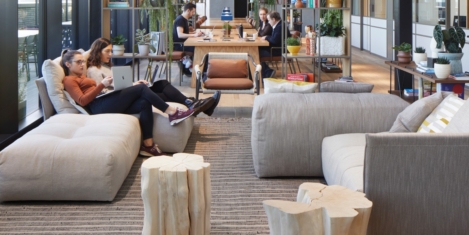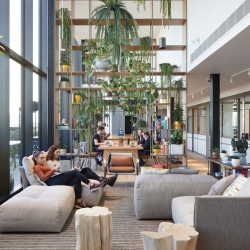To provide the best experiences, we use technologies like cookies to store and/or access device information. Consenting to these technologies will allow us to process data such as browsing behaviour or unique IDs on this site. Not consenting or withdrawing consent, may adversely affect certain features and functions.
The technical storage or access is strictly necessary for the legitimate purpose of enabling the use of a specific service explicitly requested by the subscriber or user, or for the sole purpose of carrying out the transmission of a communication over an electronic communications network.
The technical storage or access is necessary for the legitimate purpose of storing preferences that are not requested by the subscriber or user.
The technical storage or access that is used exclusively for statistical purposes.
The technical storage or access that is used exclusively for anonymous statistical purposes. Without a subpoena, voluntary compliance on the part of your Internet Service Provider, or additional records from a third party, information stored or retrieved for this purpose alone cannot usually be used to identify you.
The technical storage or access is required to create user profiles to send advertising, or to track the user on a website or across several websites for similar marketing purposes.
 A new research report released by Siemens Smart Infrastructure, titled ‘A New Space Race,’ has highlighted the increasingly urgent need to transform global infrastructure to focus on adaptability, resiliency and decarbonisation. Data from the report claims infrastructure leaders worldwide recognise the need for digitalisation to tackle challenges in energy systems and the built environment. (more…)
A new research report released by Siemens Smart Infrastructure, titled ‘A New Space Race,’ has highlighted the increasingly urgent need to transform global infrastructure to focus on adaptability, resiliency and decarbonisation. Data from the report claims infrastructure leaders worldwide recognise the need for digitalisation to tackle challenges in energy systems and the built environment. (more…)






 As SMEs (small and medium-sized enterprises) grapple with a myriad of challenges to keep their companies running successfully,
As SMEs (small and medium-sized enterprises) grapple with a myriad of challenges to keep their companies running successfully, 
 An innovative hybrid-power shading solution has been launched which brings all the benefits of motorised blinds with none of the costly power supplies and electrical works to occupants and designers of commercial buildings.
An innovative hybrid-power shading solution has been launched which brings all the benefits of motorised blinds with none of the costly power supplies and electrical works to occupants and designers of commercial buildings. 


 The 2021 Digital Etiquette Study by
The 2021 Digital Etiquette Study by 
 People in the UK feel overwhelmed by the amount of data available to them when making critical decisions at work, according to a new study by
People in the UK feel overwhelmed by the amount of data available to them when making critical decisions at work, according to a new study by 
 Despite their best intentions, most employers are facing difficulties responding to changing employee expectations around employee experience and wellbeing during the pandemic. 69 percent of HR leaders admit that their efforts to improve employee experience are being held back by a lack of a clear strategy, and 76 percent report that they are struggling to adapt their employee experience to meet the needs of a hybrid workforce.
Despite their best intentions, most employers are facing difficulties responding to changing employee expectations around employee experience and wellbeing during the pandemic. 69 percent of HR leaders admit that their efforts to improve employee experience are being held back by a lack of a clear strategy, and 76 percent report that they are struggling to adapt their employee experience to meet the needs of a hybrid workforce. 
 Millions of British workers face uncertainty as a snapshot of the nation’s work practices claims that one in five employees are unsure whether they’ll be expected to work remotely, onsite, or a mix of both in the future. Without having a clear decision from their employer, some employees are unsure about their organisations’ return-to-office plans.
Millions of British workers face uncertainty as a snapshot of the nation’s work practices claims that one in five employees are unsure whether they’ll be expected to work remotely, onsite, or a mix of both in the future. Without having a clear decision from their employer, some employees are unsure about their organisations’ return-to-office plans. 
 Results from
Results from 
 Managers in the increasingly digital, knowledge-fuelled and hybrid working environment may not be able to see the “invisible” strains on workers juggling home life and their workloads, a report by
Managers in the increasingly digital, knowledge-fuelled and hybrid working environment may not be able to see the “invisible” strains on workers juggling home life and their workloads, a report by 









October 22, 2021
Employee experience is more important than ever
by Lizzie Rolley • Comment, Wellbeing, Working culture, Workplace